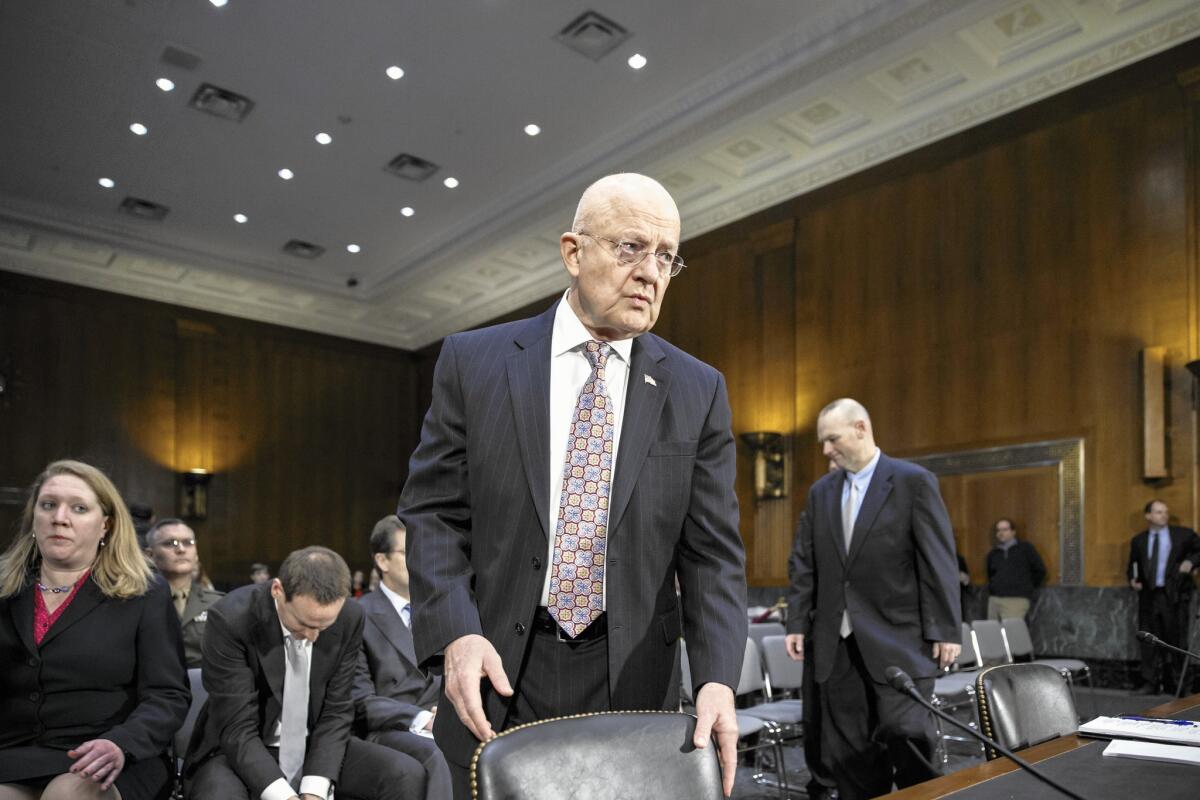U.S. intelligence chiefs answer questions on Russian hacking of the 2016 election

- Share via
Several American intelligence chiefs testified publicly for the first time Thursday that Russian spy services, directed by the Kremlin’s most senior leaders, deliberately interfered in the U.S. presidential race, a conclusion that President-elect Donald Trump has repeatedly challenged.
Director of National Security James Clapper; Adm. Michael Rogers, head of the National Security Agency; and Marcel J. Lettre, undersecretary of Defense for intelligence, answered questions at a Senate Armed Services Committee hearing on the Russian theft and leaks of thousands of emails before the November election.
“We assess that only Russia’s senior-most officials could have authorized the recent election-focused data thefts and disclosures, based on the scope and sensitivity of the targets,” Clapper, Rogers and Lettre wrote in joint remarks submitted for the hearing.
Russian cyber attacks pose “a major threat” to the U.S. government, the military and financial institutions, as well as the nation’s electrical and communications infrastructure, the intelligence officials said.
“Russia is a full-scope cyber actor that poses a major threat to U.S. government, military, diplomatic, commercial, and critical infrastructure and key resource networks because of its highly advanced offensive cyber program and sophisticated tactics, techniques, and procedures,” the officials said.
“For example, Russian actors have seeded falsified information into social media and news feeds and websites in order to sow doubt and confusion, erode faith in democratic institutions, and attempt to weaken Western governments by portraying them as inherently corrupt and dysfunctional,” the officials said.
The committee chairman, Sen. John McCain (R-Ariz.), and many others in Congress have expressed alarm at Trump’s repeated rejection of intelligence judgments that say senior officials at the Kremlin, including Russian President Vladimir Putin, conducted cyber attacks intended to discredit U.S. democracy and help elect Trump.
Russia’s theft and disclosure of emails during the 2016 elections was “an unprecedented attack on our democracy,” McCain said at the start of the hearing, which was broadcast live on cable news networks.
The U.S. has not responded harshly enough to cyber attacks from Russia, China, North Korea and other countries, McCain said.
“Our adversaries have made the calculation that the reward for attacking America in cyberspace outweighs the risk,” McCain said.
U.S. intelligence officials have seen the Kremlin launch more and more aggressive cyber operations in recent years, including hacks designed to mask the true actors using false online identities.
The hearing, the first on the hacking since the November election, comes a day before Trump is to get a top-level briefing on the issue from Clapper, CIA Director John Brennan and National Security Director Adm. Mike Rogers at Trump’s office in New York.
The intelligence officials also will brief Trump on the broader review that President Obama recently requested on Russian and Chinese hacks during the 2008, 2012 and 2016 U.S. elections and what was learned from those intrusions, two U.S. officials said.
They said the classified report is nearly done and likely will be given to Obama on Thursday. Obama ordered it completed before he leaves office on Jan. 20 to ensure a full record is available, aides have said.
Senior intelligence officials are grappling with how much of the report to make public without exposing sensitive surveillance systems and intelligence assets. They already have blamed two Russian spy services, the GRU and the FSB, for organizing the theft and release of sensitive emails last summer and fall, but haven’t said precisely how they know.
Parts of the report will be declassified and made public next week, Clapper told lawmakers.
Clapper said the intelligence community stood “actually more resolutely” on its Oct. 7 statement that first blamed Russia for conducting cyber attacks during the presidential campaign.
“We have no way of gauging the impact ... it had on the choice the electorate made,” Clapper said. “Whether or not it was an act of war is a very heavy policy call. I don’t think the intelligence community should weigh in on that; I do think it should carry great gravity.”
The Russian operations to influence the U.S. elections didn’t involve changing vote tallies, Clapper said.
“It was a multifaceted campaign,” Clapper said. “The hacking was only one part of it. It also entailed classical propaganda, misinformation, fake news” that continues today, he added.
The hearing, the first on the hacking since the November election, comes a day before Trump is to get a top-level briefing on the issue from Clapper, CIA Director John Brennan and National Security Director Adm. Mike Rogers at Trump’s office in New York.
The intelligence officials also will brief Trump on the broader review that President Obama recently requested on Russian and Chinese hacks during the 2008, 2012 and 2016 U.S. elections and what was learned from those intrusions, two U.S. officials said.
They said the classified report is nearly done and likely will be given to Obama on Thursday. Obama ordered it completed before he leaves office on Jan. 20 to ensure a full record is available, aides have said.
Senior intelligence officials are grappling with how much of the report to make public without exposing sensitive surveillance systems and intelligence assets. They already have blamed two Russian spy services, the GRU and the FSB, for organizing the theft and release of sensitive emails last summer and fall, but haven’t said precisely how they know.
More to Read
Sign up for Essential California
The most important California stories and recommendations in your inbox every morning.
You may occasionally receive promotional content from the Los Angeles Times.














